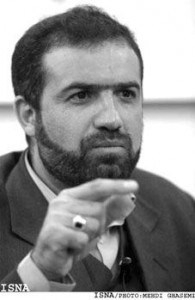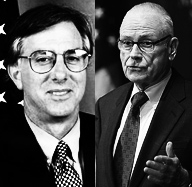Well, this seems absurd but it’s true. Among the other offenses, blogging is the last one to be punished by death. Here is a report by Aljazeera on the development of this story. Just last week, a blogger died in Evin Prison in Tehran.
Monthly Archives: March 2009
“Cohen: From Tehran to Tel Aviv”
Obama’s message to Iranians on the Persian New Year seems to be beyond a change just in the U.S. rhetoric towards Tehran. Many in the U.S. media have misinterpreted the Iranian Supreme Leader’s response to President Obama as “rebuffing” his positive message, which is not the case. In an analysis for the Times, Roger Cohen explains the significance of such messages. I find his analysis is pretty accurate. When it comes to foreign policy Iranian authorities are pretty much pragmatic. As Cohen suggested any change in the US-Iran relations needs courage. There are countries that are not in favor of normalization of such relations. They will do whatever is needed to avoid this. But it’s in the interest of the United States to talk to Iranians and more than just talking do something real. However, the fact that the President is articulate and cute is not enough. If Obama steps forward and do something real, Iranians will respond positively. It’s even in the interest of Israelis to be more rational and never forget that a good US-Iran relations is good or them as well:
“The innovations in the president’s Persian New Year, or Nowruz, overture to Tehran were remarkable. He referred twice to “the Islamic Republic of Iran,” a formulation long shunned, and said that republic, no other, should “take its rightful place in the community of nations.” Here was explicit American acceptance of Iran’s 30-year-old clerical revolution.
He said establishing constructive ties would “not be advanced by threats,” a retreat from his own campaign position that the military option must always remain on the table. Instead he offered “mutual respect.” (Read the rest of this piece here)
Obama’s Nowruz Message to Iranians: Positive But Not Enough
President Obama’s Nowruz message to Iranians might seem as a sign of change in Iran-U.S. relations. Unlike his predecessor, Barack Obama chose a respectful tone, not only to the Iranian people but also to the Iranian leaders, and a less threatening language. In a part of his message he refereed to Saadi, a very prominent and popular Iranian poet of hundreds of years ago, which was received by many Iranians very positively. From the interview I did with Kazem Jalali just last week, you get the sense that Obama’s change of tone is not enough to be taken seriously by the Iranian leaders. They have asked for change in actions. Beyond Iranians conspiracy, I think it makes sense, they helped the United States in Afghanistan and received nothing but a membership to the Axis of Evil Club. Also, the United States has done everything to undermine Iran’s influence in the region, impose sanctions on Tehran’s economy and finally an aggressive attempt to overthrow the regime. On Iran’s side, Ayatollahs have not been friendly to Washington as well. They have intensely have used all their cards to make trouble for Americans in the Middle East. Continue reading Obama’s Nowruz Message to Iranians: Positive But Not Enough
Q&A: U.S.-Iran Détente Unsettles Persian Gulf States

BERKELEY, California, Mar 17 (IPS) – Dr. Kazem Jalali, an influential conservative member of Iran’s parliament, the Majlis, and rapporteur of the National Security and Foreign Policy Commission, sees possibilities for a thaw with Washington, but believes that many Arab states in the Gulf “see their interests in keeping the current state of continual conflict among the west, the U.S., and the Islamic Republic of Iran.”
In recent years, Tehran has experienced growing tensions with its Arab neighbours, particularly over the development of its nuclear programme. The latest diplomatic crisis came after former Majlis speaker Ali Akbar Nateq Nori referred in a speech to Bahrain as a former province of Iran. His remarks caused a firestorm of angry protests from numerous Arab nations, particularly Saudi Arabia and Egypt, and prompted Morocco to sever relations with Iran – although Bahrain itself has remained friendly. Continue reading Q&A: U.S.-Iran Détente Unsettles Persian Gulf States
Is Dennis Ross Iran’s Real Envoy?
 HuffPost-As expected among the foreign policy community, Dennis Ross was appointed Iran’s “special advisor” and curiously not the “special envoy”– which begs the question of whether or not he will be the major voice in Washington on US-Iran relations.
HuffPost-As expected among the foreign policy community, Dennis Ross was appointed Iran’s “special advisor” and curiously not the “special envoy”– which begs the question of whether or not he will be the major voice in Washington on US-Iran relations.
Appointing an envoy or advisor to Iran has posed a challenge to the U.S. administration, considering the complex involvement of this country with most of the U.S. conflicts in the Middle East. The main concern has been to appoint a diplomat who can talk to Tehran, a regime that Washington loves to hate despite its significant influence on most of the U.S. foreign policy priorities in the region. Continue reading Is Dennis Ross Iran’s Real Envoy?
Post Evil Era and “The Axis of Upheaval”
It does not seem that President Obama is not into renewing the membership of Axis of Evil Club members. The United States has more important things to deal with. Economy, fundamentalism and also energy crisis- don’t miss two unfinished wars in Afghanistan and Iraq. So ” forget Iran, Iraq, and North Korea—Bush’s “Axis of Evil.” As economic calamity meets political and social turmoil, the world’s worst problems may come from countries like Somalia, Russia, and Mexico. And they’re just the beginning.” The Foreign Policy Monthly explains why:
“The resources available for policing the world are certain to be reduced for the foreseeable future. That will be especially true if foreign investors start demanding higher yields on the bonds they buy from the United States or simply begin dumping dollars in exchange for other currencies.
Economic volatility, plus ethnic disintegration, plus an empire in decline: That combination is about the most lethal in geopolitics. We now have all three. The age of upheaval starts now. (Read the full story here…)
